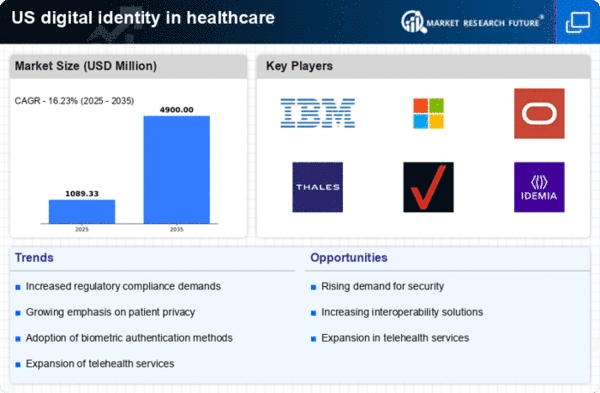Increased Cybersecurity Threats
The digital identity-in-healthcare market is also driven by the rising incidence of cybersecurity threats targeting healthcare organizations. With the increasing digitization of health records and patient information, the healthcare sector has become a prime target for cyberattacks. Reports indicate that healthcare data breaches have surged by over 50% in recent years, prompting organizations to prioritize cybersecurity measures. As a response, there is a growing emphasis on implementing advanced digital identity solutions that can mitigate these risks. The market is expected to see a surge in demand for identity verification technologies, which are essential for protecting sensitive patient data from unauthorized access. This heightened focus on cybersecurity is likely to contribute to the overall growth of the digital identity-in-healthcare market.
Patient Empowerment and Engagement
The digital identity-in-healthcare market is being propelled by a growing emphasis on patient empowerment and engagement. Patients are increasingly seeking control over their health information and are demanding secure access to their medical records. Digital identity solutions facilitate this access while ensuring that patient data is protected. The trend towards patient-centric care models is driving healthcare organizations to invest in technologies that enhance patient engagement. Research indicates that organizations focusing on patient empowerment can improve patient satisfaction by up to 30%. This shift towards patient engagement is likely to stimulate demand for digital identity solutions, as healthcare providers recognize the importance of fostering trust and transparency in their relationships with patients.
Regulatory Compliance Requirements
The digital identity-in-healthcare market is significantly influenced by the evolving regulatory landscape in the United States. Compliance with regulations such as the Health Insurance Portability and Accountability Act (HIPAA) and the 21st Century Cures Act is crucial for healthcare organizations. These regulations mandate stringent data protection measures and secure patient identity management. As a result, organizations are increasingly investing in digital identity solutions to ensure compliance, which is projected to drive market growth. The market is expected to reach approximately $3 billion by 2026, reflecting a compound annual growth rate (CAGR) of around 15%. This regulatory pressure compels healthcare providers to adopt advanced digital identity technologies, thereby enhancing the overall security and integrity of patient data.
Growing Demand for Telehealth Services
The rise in telehealth services in the United States has created a substantial demand for robust digital identity solutions. As healthcare providers increasingly offer remote consultations, the need for secure and reliable patient identification becomes paramount. Digital identity-in-healthcare market solutions facilitate seamless access to telehealth services while ensuring that patient data remains protected. According to recent estimates, the telehealth market is projected to grow to $250 billion by 2026, with a significant portion of this growth attributed to the need for secure digital identity verification. This trend indicates that healthcare organizations are likely to invest heavily in digital identity technologies to support telehealth initiatives, thereby propelling the market forward.
Technological Advancements in Identity Management
Technological advancements in identity management systems are playing a pivotal role in shaping the digital identity-in-healthcare market. Innovations such as biometrics, artificial intelligence, and blockchain technology are enhancing the efficiency and security of patient identity verification processes. These technologies enable healthcare providers to streamline operations while ensuring compliance with regulatory standards. The integration of AI-driven analytics is particularly noteworthy, as it allows for real-time monitoring and fraud detection. As healthcare organizations increasingly adopt these advanced technologies, the digital identity-in-healthcare market is projected to experience substantial growth, with estimates suggesting a market value of $4 billion by 2027. This trend indicates a shift towards more sophisticated identity management solutions that can adapt to the evolving needs of the healthcare sector.
















